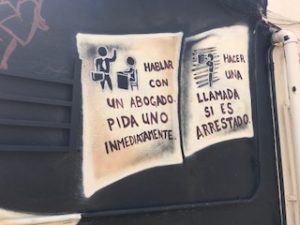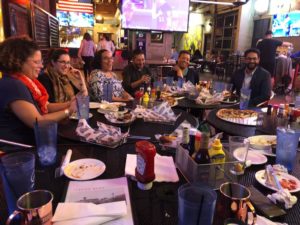
By Natalia Swanson, Program Director for Healthy Eating and Active Living, Mary Black Foundation
Back in July of 2017, as I was gathering my luggage from the conveyor belt at the airport, a good friend of mine sent me a text.
“Do you know of an immigration lawyer? A friend was just detained.”
My heart sank and I felt a small part of me die as my friend continued to send me more details. Maria (name changed to protect her identity) has two boys in elementary school and a husband. Tears began to well in my eyes as I thought about this young mother now detained and separated from her family. Immediately I began texting other friends and allies for potential lawyers. I was able to send a couple of names and phone numbers to my friend, but everyone that I talked to told me that from what they had heard, if someone was detained by immigration, it was practically impossible now to have him or her released. Yet for this one woman and her family, I was going to do all that was within my power.

During our first PLACES site visit to Wichita, I was encouraged to be surrounded by other professionals in philanthropy who desire to use their position to “be of service to the arc of justice” (as stated by our consultant, Bina Patel). The work in and with our communities is urgent. Families are being separated, single mothers are trying to provide for their children, babies of African American moms are dying at a much higher rate before they reach their first birthday, children are entering school unprepared to learn, and communities remain marginalized due to years of systems and policies that have created deep inequities. Herein lies what for me remains a tension and one of the key lessons I have taken away from this first site visit: how can we carry forward our work — not just our professional work, for I believe that when the work of justice becomes your mission, it guides all that you do — with “reflective urgency?”
In the world of philanthropy, our tendency is to enter a space and desire be seen as the expert. (This is probably true for all professions, admittedly.) Even our job titles reflect this. This is mine: “Healthy Eating | Active Living Program Specialist.” We want to provide answers; we want to solve the problems. Yet the work of racial equity requires us to think differently. The systems that make up our world were created over centuries. The events that we see, such as an immigrant mother detained and separated from her family, are just the tip of the iceberg. Beneath it lie patterns of these sorts of injustices: It is not just this one mother and family; there are still more than 2,000 who have been separated from their parents, with the path to reunification painfully unclear. Underneath the patterns are policies and structures that make family separation a real fear for many immigrants and marginalized people. All of this is rooted in our culture, our values, and our biases. To be able to get to these deep roots, we need to give ourselves space and time. We need to slow down. And we need to be okay with the possibility that we will not always know the answer.
Teresa Lovelady is the CEO of HealthCore Clinic and one of the many individuals we had the privilege of meeting in Wichita. She is a woman that radiates love for people. She took over this federally qualified healthcare center and began making significant changes to the way they do the work. She told us that 80 percent of the women they serve in their women’s clinic are uninsured and will never be eligible for Medicaid because they are undocumented. Even when the state’s governor turned away funding to support services for refugees, she figured out a way to bring funding to their clinic to assist this population. Teresa acknowledged the trauma that children from immigrant and refugee homes had and continued to face. In an effort to address trauma and support children from these homes, she integrated a behavioral health screening into the regular medical screening. If the screening identifies that a child needs support, the screener refers him or her to an on-site therapist. It was inspiring to see know that Teresa believes a person’s health is more than the healthcare they can receive. Health is about the whole individual. She believes this so much that everyone on her team, even the janitor, earns at least $12 an hour. These are just some of the bold moves that this CEO in Wichita has made. They are moves that reveal her understanding of the urgency behind it all. Theresa, as she closed her session with us said, “I love people. I love people so much that I will do whatever it takes and whatever I [need] to make certain that people are taken care of.”
I know I am going to learn so much more through the remaining months of the PLACES fellowship. Therefore, I say this cautiously: After this first site visit, I have two desires that I am holding close. First, that I would continue to learn the practice of reflection, the practice of slowing down and digging deep to better understand. Second, that the people that we hear from and the personal stories that we hear about in our site visits would inspire and continue to kindle this urgent fire to do things differently. I hope that we never lose sight of the Marias and Teresas of the world and that these individuals would push us to live lives of compassion, humility, and service – all for the “arc of justice.”
Catch up on our last Going PLACES blog here.
About the Author

Natalia Valenzuela, Mary Black Foundation
Natalia Valenzuela Swanson joined the Mary Black Foundation in March 2015 as the Healthy Eating | Active Living program specialist. Prior to joining the foundation, Natalia worked at the Upstate Workforce Investment Board as the associate director and served on the board of a local non-profit working to make Spartanburg a vibrant, connected and healthy community. Natalia completed the United Way Non-Profit Fellows Program, as well as Leadership Spartanburg. Natalia has a master’s degree in city and regional planning from Clemson University and a bachelor’s degree from Columbia College. She is a native of Ecuador and her husband is from South Dakota.
